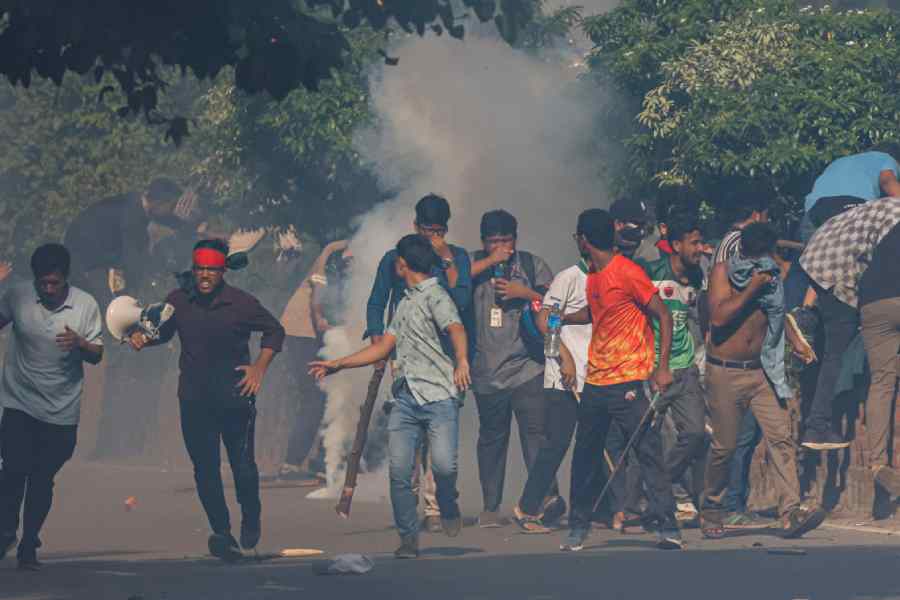Educational institutions across Bangladesh have been shut down for an indefinite period as the Sheikh Hasina government grapples with violent student protests against the job quota system that have claimed at least seven lives.
The forum of protesting students added to the uncertainty on Wednesday evening as it announced a “complete shutdown” on Thursday even as the government tried to turn the tables on the protesters by closing down campuses and clearing out hostels.
In a Facebook post, Asif Mahmud, one of the organisers of the movement seeking reforms in government jobs, announced the shutdown call to protest “the killings, beatings of protesters and others” by various law-enforcing agencies and the student wing of the ruling Awami League and to demand a reform in the quota system.
The strike call, announced within minutes of an address to the nation by Hasina at 7.30pm in which she urged the students to be patient and have faith in the country’s judicial system, indicated a hardening of stand by the protesters, who have been claiming that their movement is “apolitical”.
“The student wings of the Opposition like the BNP and the Jamaat-e-Islami have infiltrated the movement.... They are using the students to destabilise the country with a violent movement. It’s a conspiracy and that’s evident from their action,” Barrister Biplab Barua, Hasina’s special assistant and the office secretary of the ruling Awami League, told this newspaper over phone from Dhaka on Wednesday evening.
Late on Wednesday night, the BNP issued a statement urging people to take part in the shutdown.
Over the last 48 hours, prominent campuses across the country have witnessed clashes between the protesting students and law-enforcing agencies such as the police, RAB and the BGB. There were also reports that the Bangladesh Chhatra League, the student wing of the ruling party, attacked the protesters in Dhaka, Chittagong and Rangpur.
These reports on attacks on students came as an embarrassment for the government, which was urged by the United Nations on Wednesday to protect the demonstrators against any form of threat or violence.
Appearing in a black sari, indicating that she was mourning the deaths, Hasina on Wednesday evening addressed the nation and announced the government’s decision to conduct a judicial probe into the loss of lives.
“I am unequivocally declaring that measures will be taken against those who have carried out the killings, looting and criminal activities, no matter who they are. They will be punished,” she said. “I am also declaring that a judicial inquiry will be conducted to ensure justice,” she added.
She also tried to underscore that the government was sympathetic to the protesting students, who have been demanding a reform in the quota system introduced by Father of the Nation Mujibur Rahman in 1972.
The bone of contention in the student movement sweeping across Bangladesh is the 30 per cent reservation in jobs — which is part of around a 56 per cent quota, including 10 per cent each for women and people from backward districts — in the public sector for the relatives of war heroes who fought for the country’s independence from Pakistan in 1971.
Back in 2018, Hasina — in the face of massive student protests — had abolished the system of reservation, which was subsequently challenged in the high court. Earlier this month, the high court reinstated the 30 per cent quota, which triggered the recent wave of protests.
Hasina explained that the government had approached the Supreme Court and filed a petition against the order.
“The apex court has set a date for the hearing (August 7). The court agreed to listen to the students. The issue can be resolved through legal means.... I am requesting all to wait patiently till the verdict is delivered. I believe our students will get justice from the apex court, they will not be disappointed,” she said in her address.
The strike call by the protesting students, who enjoy the support and sympathy of a large section of the society, surprised some prominent civil society members.
“I don’t understand this sudden strike call... It gives a hint that the movement is slipping out of the hands of the common students and the anti-government forces are making inroads,” said an intellectual who did not wish to be named.
“The demand for quota reforms has a rational basis because it was introduced around 52 years ago.... The government is also on the same page. I don’t understand the need for violence and a strike when both sides have the same position,” the source added. This confrontation, which has added to political uncertainty in Dhaka, could have been avoided, said a senior editor of a newspaper.
“There should have been an attempt from the highest level of the government to open communication channels with the students from the very beginning.... The delay gave the Opposition parties, which are on the lookout for issues to embarrass the ruling party, a chance to make inroads among the protesters,” said the veteran journalist.
Attempts to reach Mirza Fakhrul Islam Alamgir, secretary-general of the BNP, did not yield any result as an aide said he was busy in “an online meeting” with the party’s acting chairman Tarique Rahman who is exiled in London since 2008. The BNP, in its official communication, has ruled out any links with the protests but has extended “moral support” to the students.

